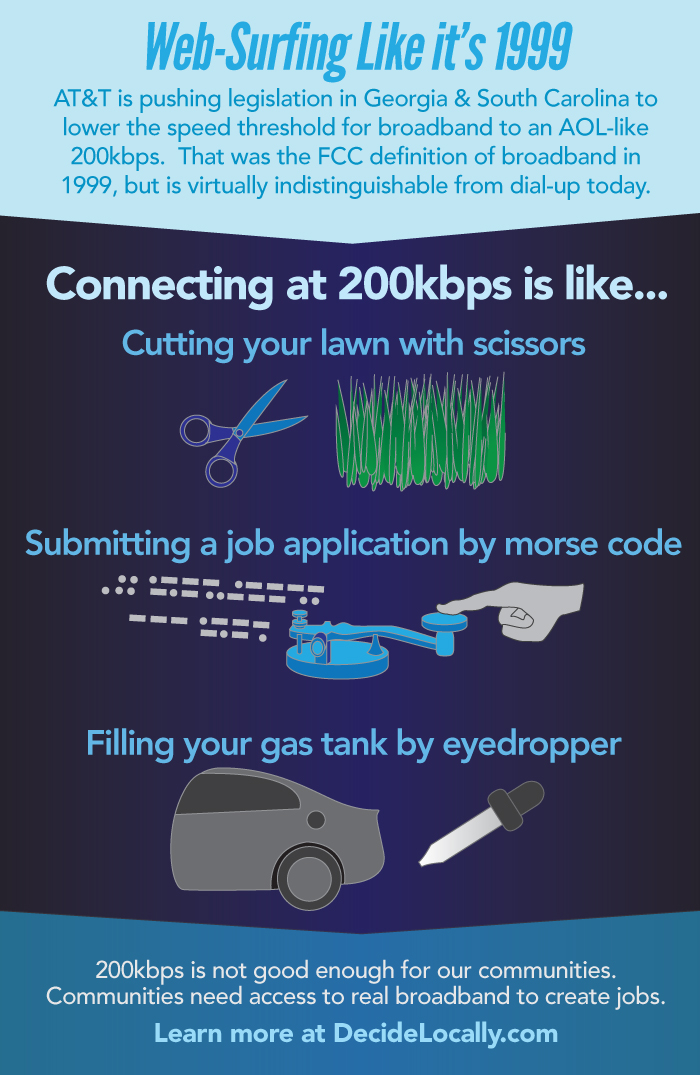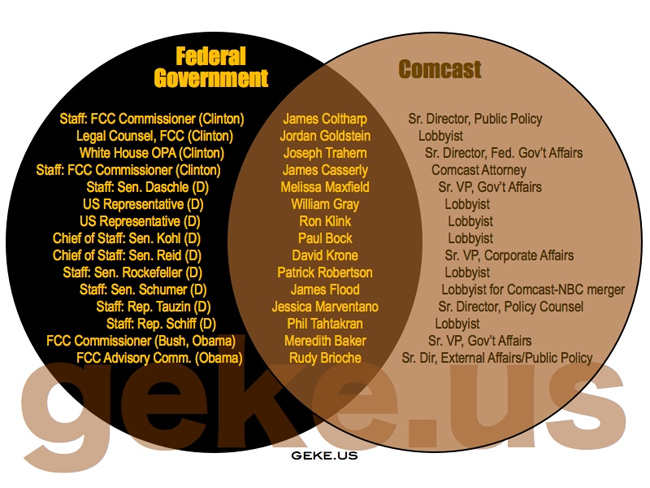
Fast, affordable Internet access for all.

SamKnows has been awarded a ground breaking contract by the Federal Communications Commission (FCC) to begin a new project researching and collecting data on American fixed-line broadband speeds delivered by Internet Service Providers (ISP's) - until now, something that has never been undertaken in the USA. The project will see SamKnows recruit a team of Broadband Community members who will, by adding a small 'White Box'’ to their home internet set up, automatically monitor their own connection speeds throughout the period of the project.Unfortunately, SamKnows appears to be documenting fantasy, not reality. To explain, let's start with a question Steve Gibson recently answered on his amazing netcast, Security Now (available via the TWiT network). A listener asked why he gets such large variation in repeated visits to Speedtest.net.
If you live in Boston, Baltimore, Albany, Syracuse, or Buffalo, you won't be getting FiOS from Verizon. Absent any public investment, you will likely be stuck with DSL and cable... like 80% of the rest of us.
Not long after Verizon announced it would cease expanding FiOS, we learned that Verizon was coming to an arrangement with the cable companies that would essentially divide the broadband market. Verizon won't challenge cable companies with FiOS and the cable companies won't challenge Verizon's "Rule the Air" wireless domain.
For a while now, the FCC has reviewed a potential deal for a Verizon purchase of Comcast's wireless spectrum. The possible deal involves multi-layered questions of anti-competitive behavior, collusion, and corporate responsibility.
Along with many other interested parties, such as the Communications Workers of America, Free Press, Public Knowledge, and the five towns are publicly opposing the deal. They have expressed their derision to the FCC but whether or not they will influence the result remains to be seen.
From a FierceTelecom article by Sean Buckley:
Curt Anderson, chair of the Baltimore City Delegation to the Maryland House of Delegates, expressed...outrage on the agreement the telco made.
"Under this transaction, Baltimore will never get a fiber-optic network, and the city will be at a disadvantage," he said. "The direct job loss will be the hundreds of technicians that would be employed building, installing and maintaining FiOS in the area. The indirect costs of this deal are even higher: the lack of competition in telecommunications will raise prices and reduce service quality.
And:
The deal, said Albany Common Council President Carolyn McLaughlin, "is not in the best interest of those who need to get and stay connected the most and is "a step backwards in bridging the digital divide."
Free Press caught and isolated an excellent question from Senator Frank Lautenberg (D-NJ) to FCC Chairman Genachowski during recent hearings. The Senator notes that many Americans do not have sufficient access to broadband but 19 states have enacted barriers to make it harder for communities to build their own.
FCC Chairman said he thinks innovative municipal solutions should be encouraged and that he looks forward to working with the Committee to address the obstacles.
 Feel free to spread it around. Higher quality pdf below.
Feel free to spread it around. Higher quality pdf below.In truly competitive markets that display some degree of commodity-like characteristics, large and small vendors tend to coexist. I'm drinking coffee right now, which is a good example. Maybe Maxwell House and Folgers (and their parent companies) have a large share of the market, competing on price for their swill. But there is plenty of room for others to differentiate their product. Dunkin and Starbucks have built huge chains on their own style of semi-premium product, while another couple of niches of premium and superpremium beans are easy enough to find. Food markets tend to be like this; check out any Whole Foods (a/k/a The Museum of Modern Vegetables) for a supply of priced-above-commodity products. I feel foolish for selling most (not all, thankfully) of my Whole Foods stock when it was in the dumps a couple of years ago. The same thing happens in many fields. Apple itself sells computers above commodity price levels. There's a whole "high end" audio business catering to those who like to show off how much they can afford to spend. The automobile industry has mass-market commodity cars and several premium tiers. Internet access in the US lacks that because the natural monopoly on outside plant is not properly regulated. If it were treated here by EU norms, then any number of ISPs could access the wire. Some would just be cheap; some would offer premium help desks among their services. That doesn't happen, however, when the usual number of "competitors" is two. Even more so when those competitors agree that they should divide up markets between themselves rather than overbuild, or (heaven forbid) let outside information providers onto their facilities. The wire should be regulated. ISPs shouldn't.Amen. Physical connections are a natural monopoly. Even if the economics supported many physical providers, having so many would be terribly inefficient. Much better to have networks that are owned by the community and have independent service providers competing to deliver services -- just like the roads.
The Minnesota Public Utilities Commission will convene an informational meeting in the format of panel discussion to examine the implications of the FCC Order with respect to (i) universal service funding, (ii) intercarrier compensation and (iii) the substantive and procedural tasks that the Commission can be expected to face in the coming months. The meeting will commence with opening remarks by Commission Chair Ellen Anderson and Commissioner Michael Rothman of the Minnesota Department Commerce. The panel discussion will be moderated by Commissioner Betsy Wergin. The panelists are:I would have specifically liked to hear how the rural telephone coops would be affected by the inter-carrier compensation changes as those charges have helped many rural communities gain access to broadband. Apparently, the MTA rep will represent their viewpoint.The Commission will welcome questions from attendees as time permits.
- Jeff Lindsey; CenturyLink
- Brent Christensen; Minnesota Telecom Alliance
- Dan Lipschultz; Moss Barnett PA, competitive carrier perspective
- Tom Cohen; Kelley, Drye Warren LLP for the American Cable Association
- Dave Conn; T-Mobile
- Dennis Ahlers; Minnesota Department of Commerce.
 Reforming this system is a deep, seemingly intractable problem. But for those looking for answers, a good place to start is with the work of Lawrence Lessig. I just finished his Republic, Lost, which offers a grand tour of the problems resulting from the present system of campaign finance.
You can also see a number of his presentations here.
His organization, the Rootstrikers aim to get to the root of problems rather than being distracted by trying to fix symptoms of deeper problems. This is precisely what we do with our focus on community networks.
Many focus solely on resolving digital divide issues, improving rural access to the Internet, lowering the cost of broadband, or the various other problems that result from narrowly-focused private corporations owning and controlling essential communications infrastructure with inadequate regulations.
Reforming this system is a deep, seemingly intractable problem. But for those looking for answers, a good place to start is with the work of Lawrence Lessig. I just finished his Republic, Lost, which offers a grand tour of the problems resulting from the present system of campaign finance.
You can also see a number of his presentations here.
His organization, the Rootstrikers aim to get to the root of problems rather than being distracted by trying to fix symptoms of deeper problems. This is precisely what we do with our focus on community networks.
Many focus solely on resolving digital divide issues, improving rural access to the Internet, lowering the cost of broadband, or the various other problems that result from narrowly-focused private corporations owning and controlling essential communications infrastructure with inadequate regulations. As you read this, remember that the FCC's National Broadband Plan largely places the future of Internet access in the hands of these corporations.
As you read this, remember that the FCC's National Broadband Plan largely places the future of Internet access in the hands of these corporations.